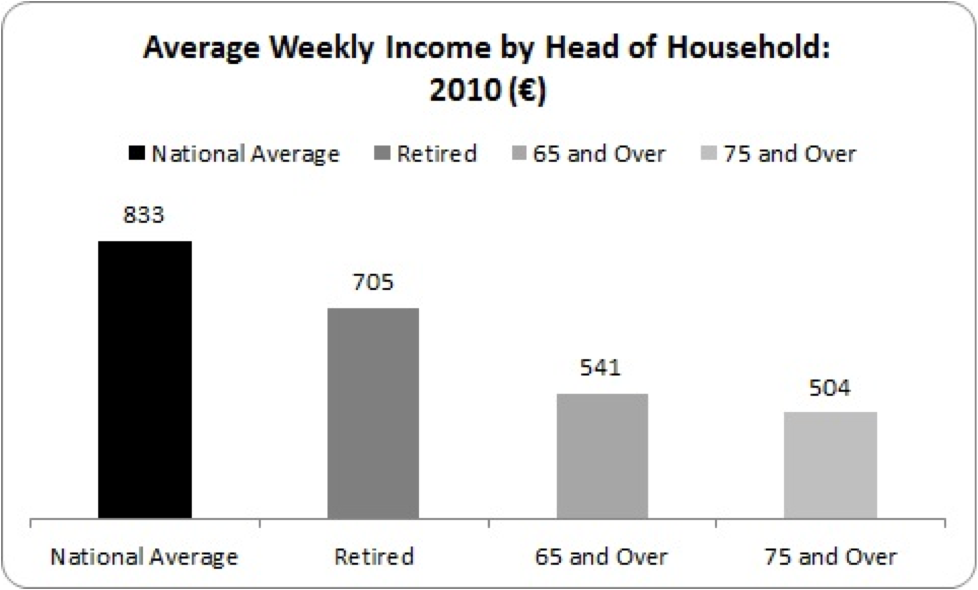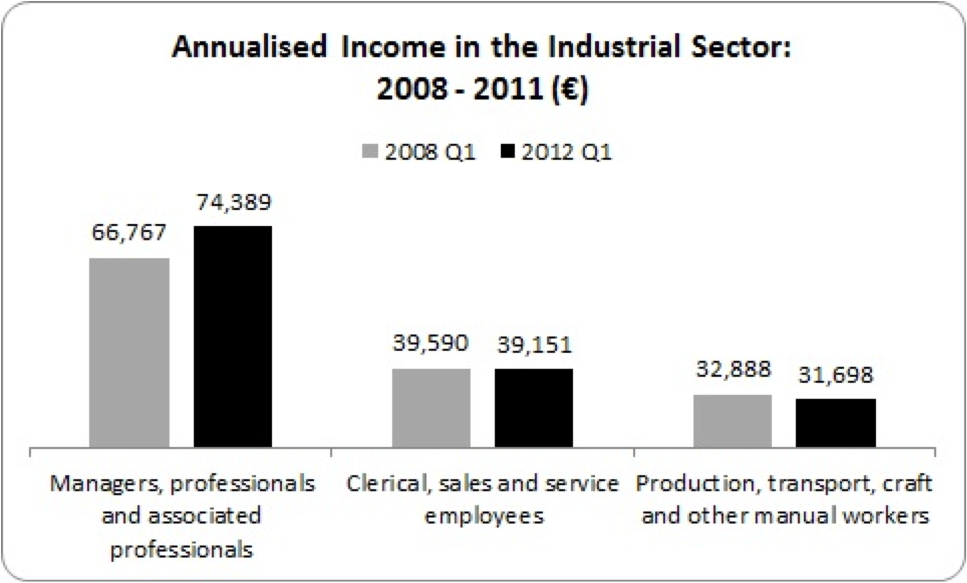Pensioners the wrong target in hunt for economic big game

Whatever about pensioners, there is definitely one group which has come through this crash with their incomes intact and then some: management and professionals, particularly in the industrial sector. By Michael Taft.
Minister of State Brian Hayes is on safari, looking for big game to hunt down. Who does he have in his sights?
“I think we need to realise that the one group of people in this country who have come through this crash and still have their incomes intact are pensioners.”
The one group? Pensioners? We’ll come back to that below.
Brian may have been looking at the EU Survey on Income and Living Conditions findings that show households headed by a retired person saw their income rise by 3.6% between 2008 and 2010 whereas the national average saw a fall of 11.6%. Of course, this fall was driven by unemployment – a phenomenon which doesn’t directly affect retirement income.
If Brian was looking at this data, he should look harder.
 A household headed by a retired person, on average, takes in approximately €700 a week. This is 15% below the average household income in the latest year we have data for. In households headed by someone over 75 years, weekly income was 40% below the national average.
A household headed by a retired person, on average, takes in approximately €700 a week. This is 15% below the average household income in the latest year we have data for. In households headed by someone over 75 years, weekly income was 40% below the national average.
Of course, averages cover up huge variations. The median figures give us a further insight.
- 50% of households headed by a retired person received less than €540 in weekly income
- 50% of households headed by a person 65 years and over received less than €455 in weekly income
- 50% of households headed by a person 75 years and over received less than €425 in weekly income
And as Older and Bolder’s Patricia Conboy pointed out – it’s not like elderly households have escaped the austerity measures. Not only was there the recent cut of €12.5 million to home care services, there have been other measures. According to Patricia:
“Older people have been affected by: the loss of the Christmas bonus, implementation of Universal Social Charge, prescription charges, electricity levy, introduction of household charge, reduction in the Fuel Allowance from 32 to 26 weeks, increased tax on home heating fuel, reduction in medical card cover for dentistry, increases in Vat and Dirt (tax on savings), cuts in frontline health and social care services, rising costs of medical insurance; and they will be affected by planned water and carbon tax charges.”
To be fair to Brian, he did say he wasn’t talking about pensioners solely dependent on the State pension. The problem is that most elderly are dependent solely or in the main on the State pension. So Brian is not talking about many pensioners who are on ‘high’ earnings, nor does he specify what is ‘high’.
Brian is hunting for big game in the economic forest. May I suggest another target? For whatever about pensioners, there is definitely one group which has come through this crash with their incomes intact and then some: management and professionals, particularly in the industrial sector.
In the first quarter of 2008, management and professionals in the industrial sector received a weekly income of €1,284. In the first quarter of 2011, their weekly income increased to €1,430. That’s not just coming through ‘intact’. That’s an increase of over 11%. Others in the industrial sector didn’t come out so well.
- Clerical and sales staff experienced a cut of 1.1% in weekly income
- Production, craft and transport workers receive a cut of 3.6%
On an annualised basis, this is how these three categories fared.
 Management grades saw their income increase by €7,600 a year. Production workers – which make up 60% of all employees in the industrial sector – saw their income fall by nearly €1,200.
Management grades saw their income increase by €7,600 a year. Production workers – which make up 60% of all employees in the industrial sector – saw their income fall by nearly €1,200.
Of course, this doesn’t mean that everyone in the managerial grades received an 11% income increase. Much of this can be accounted for by compositional changes. A number of lower-paid traditional companies have gone out of business, leaving more modern companies in place. The average would be influenced by this. But if this were the case, we should see upward changes in clerical and production grades as well. We don’t. All we are left with is a widening gap between management and worker income in the industrial sector.
If Brian wants to go after big game – the type whose income is high and growing – might I suggest he change his sights? Going after households whose income is well below the average is neither equitable nor economically rational. There’s bigger game in the economic forest.
